A Paean to . . . Onions?
We’ve recently gotten re-hooked on Foyle’s War (another one of those British mystery series that they
seem to do so well) and have been steadily—almost too speedily!—making our way
through mysterious happenings in Hastings and its environs during World War
II. Foyle is a top-notch detective:
almost the skills of a “super-detective” along the lines of Sherlock Holmes or
Hercule Poirot but with the compassion, empathy, and humility of Miss Marple. Or an Inspector Alleyn without the titled
background and his sense of noblesse
oblige. I don’t find him cuddly, but
he’s certainly not off-puttingly arrogant.
I recommend the series.
But that’s enough of Detective Chief Superintendent Foyle
for now. I’m actually interested in
something that his driver Samantha (Sam) Stewart did in a recent episode we watched. In “The French Drop” (series 3, episode 1),
the police station is raffling off an onion—which apparently was a rarity
during this period of war-time rationing.
Sam wistfully eyes the onion and asks if she could hold and sniff it, and she sighs that she hasn’t seen one since Christmas (months earlier than the
February 1941 setting of this episode).
To be sure, the onion did look lovely—as onions go—but most people today
would not think twice about the beauty of an onion or wish that we could win
one in a raffle. Really?
So, our views on the relative merits of onions aside, one
wonders about the strikingly different period this show depicts, one that
offers modern viewers a contrast that perhaps should make us somewhat more
introspective about our current wasteful consumerist society. Not to glamorize war—none of that dulce et decorum est pro patria mori bit
here—but I do wonder about the different meanings of sacrifice, of giving up
something, of having to make do with less.
Early in our acquaintance, I asked my mother-in-law if she
took sugar with her coffee. She replied
that she gave it up for the war effort (yes, World War II) more than half a
century ago and never again picked up the habit of putting sugar in her
coffee. My father who lived through
occupation and war (Korean War) one day poeticized about an egg. He held it up and waxed nostalgically about
how rare eggs used to be and how significant a source of protein it was—no ribeyes
or tenderloin roasts for them—that he and his orphaned siblings would attempt
to divide up one egg amongst nine hungry eaters. I can tell you that I never ever again
scoffed at an egg after that story!
All this makes me wonder if food is too plentiful these days
for too many people. Under such
circumstances we don’t appreciate it enough, and its lack in other areas don’t
get the proper attention needed.
Certainly, I’m aware that there are “food deserts” where it’s difficult
to get affordable and healthy produce.
But I wonder if most middle-class urban dwellers have become
desensitized to the cheapness and availability of many products, and thus we
are not mindful when we purchase something knowing that we might not consume
it and really enjoy it.
In a way, I’m hoping that two personal experiences might
help me deal with this issue with greater thoughtfulness.
Recently, Will and I spent one year living in England. When we started our year in May 2006, the
British pound was equivalent to about U.S. $1.70. That figure dramatically shifted such that,
by the time we finished our stay, the pound was often worth well over $2. My figures could be somewhat off, but I certainly cannot forget the weakening dollar! As it was, products in England were more
expensive than in the U.S. anyway (that VAT tax), but they became almost
prohibitively so once we started translating pounds into dollars. I might have bought a half-gallon of milk in
the U.S. with the idea that we’d certainly get through more than half before it
was no longer drinkable, which, for us, extended well past the expiration date
anyway. After all, if we discount the sin of wastefulness, bulk buying is more “economical” in the long run in the U.S. But, towards the end of that year in the
U.K., we were wondering if we should get the quart of milk instead and be a bit
short on our calcium intake.
In addition, our recent experiment with going vegetarian is
proving to be so much more useful than we’d ever imagined. We’ve been enjoying our vegetarian meals and
would like to continue the trend past Easter.
But, it’s also true that we still crave meat. The major difference though is that we are mindful about the fact that we are
enjoying our meat consumption on those rare days we resume our carnivore
status. This past Sunday—for our
non-vegetarian dinner—we prepared a Cinnamon-Cumin rubbed grilled whole
chicken. Because it was such a rarity
for us to eat meat these days, we enjoyed every single morsel that we
tasted. Then we packed up the cooled
leftovers and put them in the freezer for another Sunday.
A little scarcity might not be a terrible thing…



Comments
Post a Comment